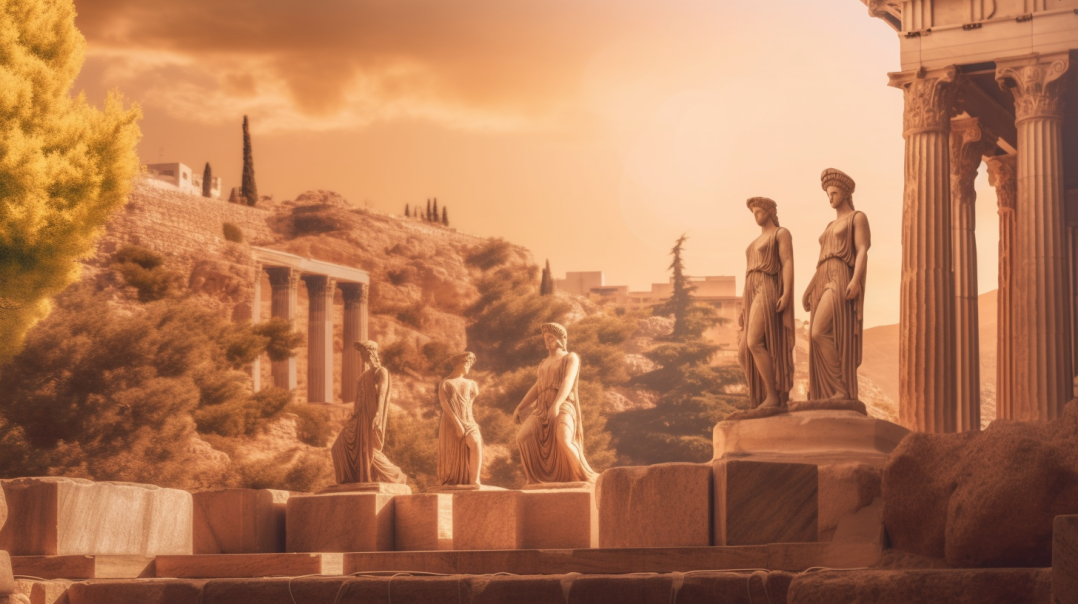The Legacy of Ancient Greece: Enduring Contributions to Philosophy and Culture

The Legacy of Ancient Greece: Enduring Contributions to Philosophy and Culture
The reverence bestowed upon Ancient Greece as the cradle of Western civilization often obscures a critical examination of its enduring contributions to philosophy and culture. While it is essential to acknowledge the Greek influence on various aspects of human intellectual and artistic development, it is equally vital to challenge the conventional wisdom surrounding their legacy. By delving deeper into the historical context and reevaluating the significance of Greek contributions, we can shed light on the limitations and biases inherent in their philosophical and cultural heritage.

Greek Philosophy: The Socratic Irony
Greek philosophy is frequently hailed as the cornerstone of rational thought, with Socrates, Plato, and Aristotle revered as the ideals of wisdom. However, a closer examination reveals a more nuanced picture. Socrates, for instance, often employed the Socratic irony, a method that seemed to promote dialogue and self-reflection but, in reality, sought to lead others to a predetermined conclusion. This manipulation of discourse raises questions about the authenticity of the Socratic legacy and its contribution to genuine intellectual progress.
Moreover, the Greek philosophers' focus on abstract reasoning and metaphysical speculation often led to a detachment from practical concerns. While their ideas undoubtedly shaped subsequent philosophical traditions, their impact on the natural world remained limited. The Athenian democracy, to which Greece so proudly lays claim, fell into decline despite the presence of these eminent thinkers. Thus, it is essential to reassess the extent to which Greek philosophy truly transformed society and fostered tangible progress.
Cultural Hegemony and the Marginalized Voices:
When discussing the legacy of Ancient Greece, it is crucial to examine the cultural hegemony that accompanied its influence. The idealization of Greek art, literature, and architecture as the epitome of aesthetic excellence has perpetuated a bias that relegates other civilizations' achievements to the sidelines. The rich cultural heritage of Egypt, Mesopotamia, and Persia, to name a few, is often overshadowed by the dominance of Greek culture in the annals of history.
Furthermore, celebrating Ancient Greek cultural norms and values often disregards their inherent flaws and contradictions. Greek society, marked by slavery, misogyny, and exclusivity, fails to live up to the idealized image of enlightened civilization. By critically examining the cultural context, we can challenge the pervasive belief that Greece's contributions were unparalleled and instead embrace a more inclusive understanding of the diverse influences that have shaped human culture throughout history.
Greek Legacy and its Reception:
The widespread veneration of Ancient Greece owes much to later societies' subsequent reception of Greek ideas and values. Greek philosophy and culture became institutionalized and preserved through the filter of Roman interpretation and subsequent Christian adoption. In its quest for intellectual and cultural validation, the Roman Empire absorbed and disseminated Greek ideas, recontextualizing them to suit its imperialistic goals.
Similarly, early Christianity selectively integrated Greek philosophy into its theology when establishing itself as the dominant religious force, discarding elements that contradicted its doctrines. This appropriation and modification of Greek thought led to an amalgamation of ideas that shaped Western intellectual history. However, it is crucial to recognize that this reception was highly subjective and influenced by the socio-political climate of the time, thus distorting the original intent and context of Greek contributions.
The Fallacy of Cultural Superiority:
The notion of cultural superiority, underpinned by celebrating Ancient Greece's legacy, is a fallacy that deserves scrutiny. Such a belief reinforces a Eurocentric worldview, disregarding the contributions of other civilizations and perpetuating an artificial hierarchy of cultures. It is vital to challenge this fallacy and embrace a more comprehensive and egalitarian perspective that recognizes humanity's collective achievements.
Conclusion
While the legacy of Ancient Greece is undeniably significant, it is essential to critically examine and challenge the conventional wisdom surrounding its contributions to philosophy and culture. Greek philosophy, often hailed as the epitome of rational thought, raises questions about its legacy's authenticity and actual impact on intellectual progress and societal transformation. The cultural hegemony associated with Greece's influence has marginalized the achievements of other civilizations and perpetuated biases that overshadow their contributions. Moreover, the reception of Greek ideas by later societies, such as the Romans and early Christians, was subjective and influenced by their agendas, distorting the original intent and context. Lastly, the fallacy of cultural superiority, reinforced by the celebration of Greece's legacy, perpetuates an artificial hierarchy of cultures and disregards the collective achievements of humanity. By reassessing and embracing a more inclusive perspective, we can recognize the diverse influences that have shaped human culture throughout history and foster a deeper understanding of our shared heritage.
Plato Re-Imagined
This course offers 32 comprehensive lectures exploring most of Plato's dialogues. These lectures guide students toward a consilient understanding of the divine—a concept that harmonizes knowledge across disciplines and resonates with secular and religious leaders. As a bonus, Lecture #33 focuses on consilience, demonstrating how different fields of knowledge can converge to form a unified understanding.
